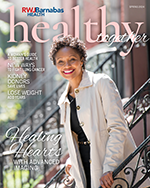
A woman’s guide to key screenings and other steps that can improve well-being throughout life.
Women’s health concerns often focus on milestones such as pregnancy, childbirth and menopause. But day-to-day and year-to-year health maintenance and preventive measures are also critical to well-being throughout life.
“Getting recommended exams, screenings and immunizations are some of the most important things you can do to prevent problems or catch them earlier, and stay healthier longer,” says Suzanne Spernal, DNP, APN-BC, RNCOB, C-ONQS, Senior Vice President of Women’s Services at RWJBarnabas Health. “Maintaining a healthy weight throughout the life span is also key to living healthy.”
Here are vital steps to take—and details on when to take them—throughout a woman’s adult life.
In Each Decade
Working with your healthcare provider to keep on top of regular tests and practices throughout life can have long-term benefits by detecting or monitoring chronic conditions that, left unchecked, often snowball into potentially serious problems.
General Health
- Full checkup: See a primary care provider yearly.
- Sleep habits: Discuss at your annual exam.
- Thyroid (TSH) test: Discuss with your healthcare provider.
- HIV screening: Get tested if you are at risk for HIV infection (due to, for example, unprotected sex, sexually transmitted disease or use of drugs with needles).
Heart Health
- Blood pressure test: Get one at least every two years if not at your annual checkup.
- Cholesterol panel: Establish your total, LDL, HDL and triglycerides in your 20s. Discuss follow-up with your provider in subsequent years.
Diabetes
- Blood glucose or A1C test: Get screened if you have sustained blood pressure greater than 135/80, take medicine for high blood pressure or are at risk of developing diabetes.
Skin Health
- Skin exam: Do a self-exam of skin and moles monthly and as part of a routine full checkup.
Oral Health
- Dental cleaning and exam: See your dentist twice yearly.
Mental Health
- Behavioral health screening: Talk with your provider about whether this would be helpful.
In Your 20s and 30s
Early adulthood is the time to establish a baseline of regular self-checks, exams and screenings that you can build on in the decades to come. You’ll continue many of these practices as you age.
Breast Health
- Breast self-exam: Regularly examine your breasts and become familiar with them so you can identify any changes and discuss them with your provider.
- Clinical breast exam: Have a provider check your breasts at least every three years.
Reproductive Health
- Pap test: Undergo screening for cervical cancer at least every three years.
- Pelvic exam: See your obstetrician-gynecologist yearly beginning at age 21.
- Sexually transmitted infection (STI) tests: Both partners should get tested for STIs, including HIV, before initiating sexual intercourse. Get a chlamydia test yearly until age 24 if you are sexually active. After age 25, continue getting this test yearly if you have new or multiple partners.
Immunizations
Seasonal influenza vaccine: Get your shot yearly.
- COVID-19: Keep up to date with boosters.
- Tetanus-diphtheria-pertussis booster vaccine: Update every 10 years.
- Human papillomavirus (HPV) vaccine: Protect against HPV with a single two-dose series up to age 26; if your vaccine series is incomplete, talk with your provider.
- Meningococcal vaccine: Discuss with your provider if you are in college or in the military.
In Your 40s and 50s
Continue following recommendations from your 20s and 30s for breast and reproductive health or discuss with your doctor, and keep up with recommended immunizations. Add the following.
Bone Health
- Bone density screening: Talk with your provider about guarding against bone conditions such as osteoporosis.
Breast Health
- Mammogram: Get yearly screening mammograms beginning at age 40.
Eye and Ear Health
- Comprehensive eye exam: If you haven’t already done so, see an eye doctor for a baseline exam at age 40, then every two to four years as your doctor advises. At age 55, start getting eye exams every one to two years.
- Hearing test: Have your hearing tested in your 40s. Retest after 10 years, then every three years from your 50s on
Colorectal Health
- Fecal occult blood test, flexible sigmoidoscopy, colonoscopy: Starting at age 45, get screened for colorectal cancer. Talk with your provider about which screening test is best for you and how often you need it.
General Health
Hepatitis C (HCV) screening: Get this onetime screening in your 50s if you were born between 1945 and 1965.
In Your 60s, 70s and Beyond
Continue following recommendations from your 40s and 50s for breast, reproductive, colorectal and eye/ear health, and keep receiving scheduled immunizations. Address the following considerations.
General Health
- Hepatitis C (HCV) screening: If you haven’t already been screened for hepatitis C and were born between 1945 and 1965, get your test.
Breast Health
- Mammogram: Continue screening annually through age 74; discuss with your provider from age 75 on.
Reproductive Health
- Pap test: Discuss continued testing with your provider.
Bone Health
- Bone density screening: If you haven’t yet had a bone mineral test, get it at least once, ideally by around age 65. Talk with your provider about repeat testing.
Immunizations
- Pneumococcal vaccine: Get this onetime vaccine to protect against pneumococcal disease.
- Herpes zoster vaccine: Talk with your provider about preventing shingles and painful complications with a onetime, two-shot series.
Learn more about Women's Health by the Decades at RWJBarnabas Health.
 View full issues of Healthy Together magazine by New Jersey region:
View full issues of Healthy Together magazine by New Jersey region: